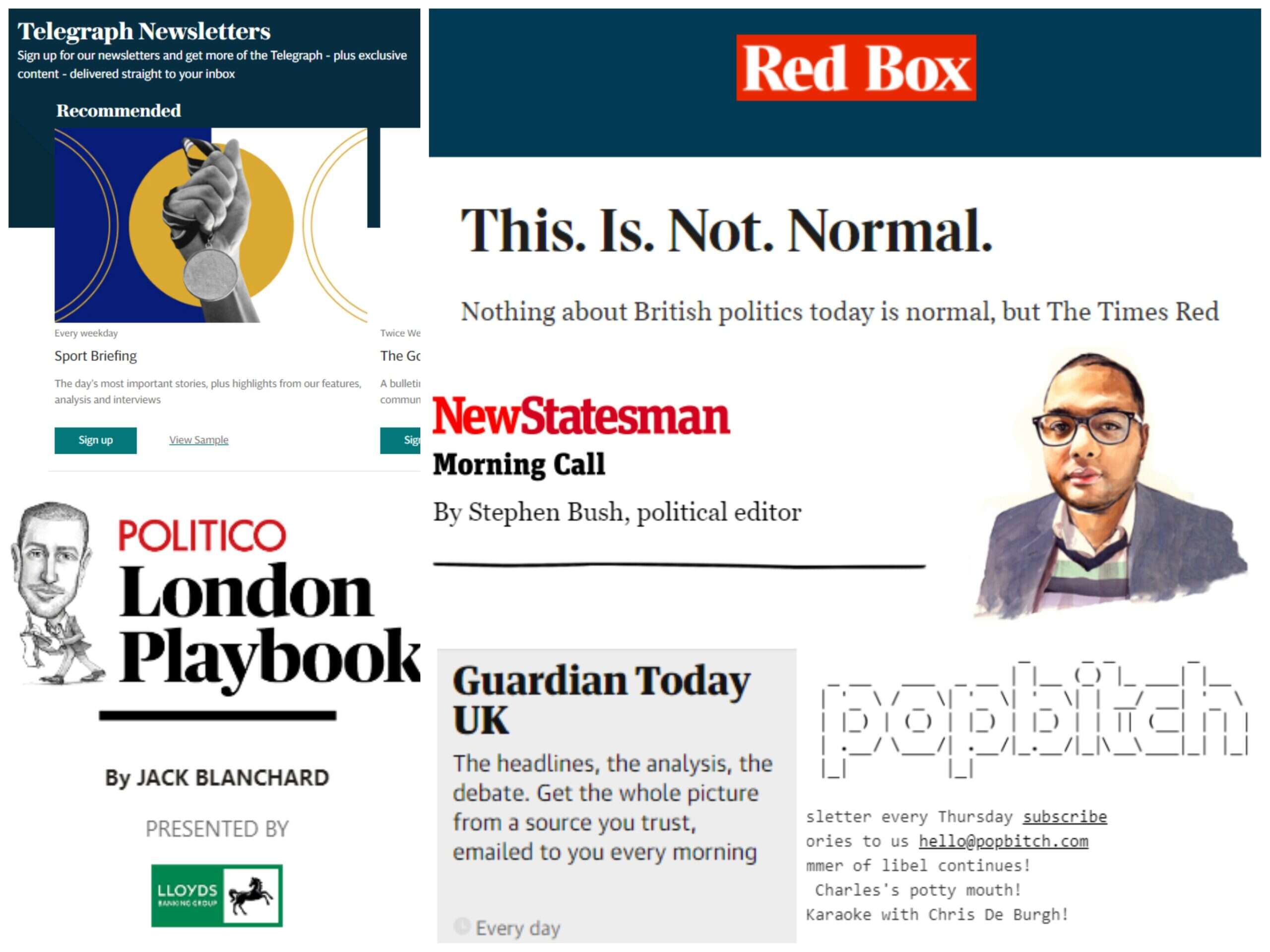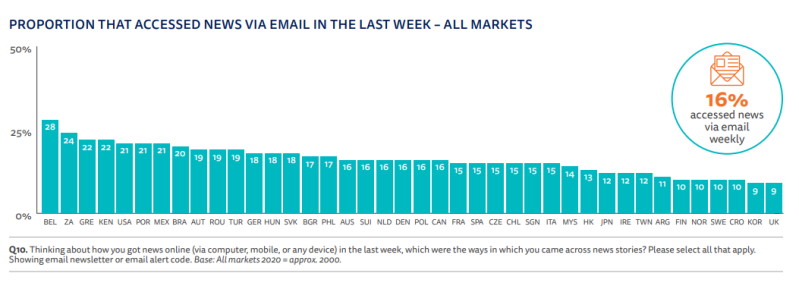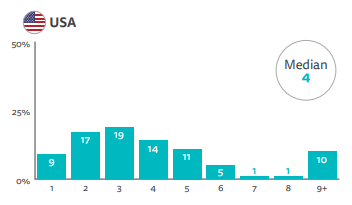
Email newsletters could end up with circulations rivalling those of newspapers in Fleet Street’s heyday, the New Statesman’s political editor has claimed, as they continue to grow in popularity.
Newsletters have become one of the most important tools for building reader habits and a “critical weapon” in reducing churn for subscription-based titles, according to a recent report.
The editors of three of the most popular missives have shared their approaches and predictions with Press Gazette.
‘We know that everyone in Downing Street reads it’
Politico’s daily Westminster email newsletter London Playbook reached 50,000 subscribers in June after three years, prompting its editor Jack Blanchard to pass the baton and claim his mornings back.
“It’s been brilliant fun,” he told Press Gazette. “It’s been the most interesting job I’ve had, but it does take its toll.”
Blanchard, who will become Politico’s first UK political editor, feels London Playbook has reached the main goal set out at its launch: to be the newsletter that everyone in Westminster reads first.
“We’ve got a big readership now: 50,000 is a nice round number. But just as importantly we know that everyone in Downing Street reads it and all the newspaper political editors read it.
“The PM complains to me about things in it. We feel like it has now reached that point of being the start to people in Westminster’s day and that was always the aim.”
Blanchard believes London Playbook’s success has come because of its “village newsletter feel” aimed at Westminster’s “close-knit community”.
As well as breaking stories and covering the big talking points of the day, Blanchard often includes an itinerary of speeches and broadcast political interviews, birthday shout-outs for staffers and “spotted” sections.
Blanchard, who is handing over to former Buzzfeed UK political editor Alex Wickham in September, discovered early on that what worked was leaving comment to his “fantastic” rivals and concentrating on being a “useful source” of information for anyone in politics.
The 7.30am digital newsletter also has an advantage over its rivals in that it can squeeze in news that the morning newspapers, with their tight print and distribution schedules, simply can’t.
“I’m not interested in what happened yesterday,” said Blanchard. “I’m all about what’s going to happen today.”
London Playbook was dreamt up by UK executive editor Kate Day to help Politico make its mark in Westminster with a way people could easily engage with the brand every day.
Email proved a useful tool for growth, with word of mouth helping London Playbook grow quickly with only a small amount of traditional advertising.
“What’s great is that once they do read it and they like it, what you find is people forward it on to other people and say ‘you must read this morning email’… it’s so easy to forward an email,” Blanchard said.
Audience saturation ‘long way away’
New Statesman political editor Stephen Bush experienced the same word of mouth growth with his newsletter Morning Call, which launched in September 2016 and also has more than 50,000 subscribers.
He learned the trade before that as assistant to Benedict Brogan, the Telegraph’s former deputy editor and chief political commentator who wrote the Morning Briefing email.

NS political editor Stephen Bush.
Despite competing with a number of popular political emails, including Times Red Box, Huffpost’s Waugh Zone and Politics Home’s Breakfast Briefing, Bush does not think there is a risk of the market becoming saturated anytime soon.
“While it’s very nice to see loads of morning newsletters doing well, none of us could I think honestly say we’re doing as well as print newspapers in the 70s, 80s or 90s,” he said.
“I personally don’t see any reason why we can’t one day be doing that well in terms of circulation and how people get their news, so I don’t think there is a peak saturation.”
He added: “I don’t see why morning newsletters shouldn’t have as big a circulation as newspapers in the 70s and 80s. Let’s get 100,000, let’s get 1m – why not?”
Bush foresees people choosing their most trusted brands and favourite newspaper sections, whether politics, sports or lifestyle, to curate a series of newsletters that fulfil their interests and needs.
Newsletters fulfil this function better than Facebook, where “there’s just so much stuff you don’t care about”, and Twitter, where people are forced to “deconstruct the news from these weird in-jokes”, said Bush.
He said newsletters are therefore a better tool for people who want something they can read to be abreast of the conversation at a work meeting or in the pub, rather than have to trawl through social media.
“I think that’s what people wanted from newspapers and they still want even though they aren’t buying newspapers.”
Bush predicts that email newsletters will become “a huge bit of our media environment” wherein publishers see them as “the thing we don’t make any money on from at the point of sale but it does generate things that do make money”, whether subscriptions or advertising revenue.
Bush sees Morning Call as having an “ambassadorial function” for the New Statesman, acting as one way the magazine brand gets out into the world, but also as a good product in its own right, reaching many more people than the print title, which sells just over 37,800 copies a week.
Personality is ‘part of what makes it work’
People like the feeling of getting a curated news product from someone whose personality they’ve come to know, he added.
“People know that I like Bob Dylan and that I will be upset if Arsenal have lost, or that I live in Hackney. They get that sense of things.
“It’s not overbearing, I think people would get annoyed if it was in the top bit, but they like that sense of it being from a person and having an immediate connection to its author.
“I think that is part of what makes it work and I think the ones that are good are mostly the ones which get that balance right.”
In the Reuters Institute for the Study of Journalism’s Digital News Report 2020, report author Nic Newman agreed, saying people “like the tone of voice and humour that can be provided by a personality guiding people though the news every day – like a television anchor”.
Others told the survey they liked morning and evening briefings because they are easy to skim and save time, and some said they find it a more efficient way to keep up with a specialist subject area than browsing online.
Just 9% of people in the UK use email for news each week, the joint lowest of 40 countries, which the report put down to a comparable lack of investment in the medium here.
Top of the list was Belgium (28%) and on average 16% of people access news through emails.

Proportion of people who access news via email on a weekly basis in 40 countries. UK is at the bottom of the rankings. Picture: Reuters Institute for the Study of Journalism
Email subscribers are attractive to publishers because they tend to be much more interested in news and have more disposable household income, the report said. They are proportionally more likely to be aged over 45.
Newman, a senior research associate, wrote: “Email newsletters, once thought of as low-tech and unfashionable, are proving increasingly valuable to publishers looking to build strong direct relationships with audiences.
“Email can help build habit and loyalty, which is particularly important for new business models such as subscription and membership.”
But Newman said email news was “no silver bullet solution”, adding: “It is still a minority activity that appeals mostly to older readers and the format can be restrictive.
“But despite its relative unsophistication, it does remain one of the most important tools available to publishers for building habit and attracting the type of customers that can help with monetisation.”
Popbitch
An early pioneer of the UK’s newsletter scene is Popbitch, a weekly missive filled with showbiz and media gossip that launched 20 years ago.
It has exploited the plain text email style to create something that downloads quickly, isn’t invasive, and can be read surreptitiously at work (or at home) but its more than 300,000 subscribers.
A pop-up daily lockdown edition, which ran for 100 days straight before ending last month, reached about 24,000 subscribers.
Although Popbitch runs some long-form features on its website under a micro-payments system alongside regular quizzes in London (now shared online because of Covid-19), the weekly email is the main focus.
Editor Chris Lochery told Press Gazette: “It’s very difficult to know what your readers will respond to if you’ve got loads of different plates spinning at any given time. We don’t really have that. We just know that the thing our readers will engage with is the weekly email.
“Email’s quite a secure and stable method of delivery that gets direct to their inbox so we’re not relying on anybody to remember to come and find us. We go straight to them. It’s quite a helpful tool.”
It’s also useful for advertisers, he said, because they can “know who it’s going to – and if you’ve got any information on the readers and the audience you know that it’s targeted”.
Email outlasted the ‘fads’
Lochery said he noticed a point “where everybody suddenly got really interested in email newsletters again” after a number of other fads over the past ten years, from digital editions to video and smart-speakers.
He said the “pivot to video” had been expensive for a lot of people, requiring investment broadcast quality equipment and a studio, “but it wasn’t the cure-all tonic that it was billed as”.
In comparison email newsletters have been “fairly consistent”, he said – which is useful, because they are low cost.
“In that respect we’ve been very lucky that email has weathered the storm in not trying to do too much and change the core of what people liked about it to move with media fads.”
Email pged@pressgazette.co.uk to point out mistakes, provide story tips or send in a letter for publication on our "Letters Page" blog




